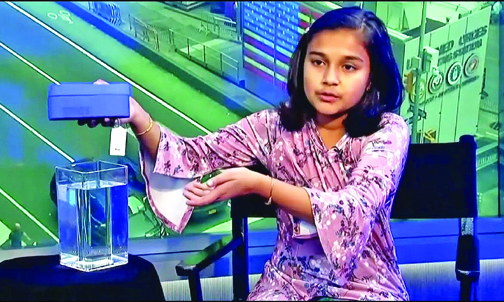Brilliant Young Minds Ages 12-29 Dream Up New Products In Science, Energy, Retail And Food
by Glen Richardson
A 29-year-old who makes funny, cute T-Shirts for geeks, nerds and pop culture lovers and a 22-year-old who makes non-dairy, high protein, low sugar bars and cookies have made Forbes’ 2019 “30 Under 30” feature that annually draws attention to the top young entrepreneurs in the U.S. and Canada.
Ramy Badie’s Denver-based TeeTurtle — whose apparel, toys and games are licensed characters for Disney and Marvel — was expected to generate $20 million in 2018 revenue. Daniel Katz’s high-protein and low-sugar No Cow candy bars are in 15,000 stores nationwide and recorded $10 million in 2017 revenue.
Also making the list is Joel Jean, a cofounder of Swift Solar, a startup manufacturing lightweight solar panels that are cheaper and more efficient than conventional panels. Finally, the list includes Denver student Gitanjali Rao, winner of the 2017 Discovery Education 3M Young Scientist Challenge. Now 12, she invented a quick, low-cost test to detect lead-contaminated water.
Designed To A Tee
During his first year in medical school, 29-year-old Ramy Badie entered a T-shirt design contest to win money for tuition. He ended up dropping out of school to found TeeTurtle. He is the winner in Forbes’ Under 30 Retail and Ecommerce category.
No matter what the product line, creator Badie’s undertakings are always about the design. As an example, to fund production of a card game about Unicorns he set out to raise $10,000 to fund production of the game on Kickstarter. He reached his goal in just 71 minutes and collected more than $1.8 million for the project. Support from more than 30,000 backers was more than every other project on the fundraising website at the time.
On TeeTurtle’s website Badie explains the company this way: “We are a bunch of kids at heart having a great time because every one of us is passionate about what we do and we believe in the company and the product.”
A No Cow Footprint
When Daniel Katz dropped out of college after just three months in 2013 to hawk his own line of energy drinks, his intense selling schedule found him eating protein bars instead of real meals. But whey protein upset his stomach, and gave him a new product idea: a high-protein but low-sugar and non-dairy bar. The Denver-based company has raised $100,000 in funding from blue chip investors like General Mills’ venture capital arm 301 Inc.
The rapidly growing distribution footprint of No Cow — with offices on Blake St. in LoDo — has products in more than 15,000 stores across the country including GNC, Vitamin Shoppe, CVS, Sprouts, and Wegmans.
After initially moving the business to his hometown of Cincinnati, Katz relocated his growing startup to Denver, due to the physically mindful attitudes of Colorado consumers. “People here are active, they’re happy, they’re on trend,” says Katz. “And that’s who we represent as a brand.”
Solar Cells Shine
As a Ph.D. student at MIT, Joel Jean, was a member of a research team that developed record-thin and lightweight solar cells. As a co-founder of Swift Solar, he aims to develop lightweight, flexible, and efficient solar panels using metal-halide perovskite materials.
Prior to joining Swift, he served as Executive Director of the Tata-MIT GridEdge Solar research program, which focuses on scale-up of new solar photovoltaic technologies for India and other developing countries.
As a researcher and NSF Fellow at MIT, he developed ultra-lightweight and flexible solar cells that were recognized by the Katerva Award in 2017. He co-authored the MIT Future of Solar Energy Study and has worked extensively on emerging PV materials and devices, techno-economic analysis, and energy and climate policy. Jean, 29, holds a PhD and SM in electrical engineering from MIT and a BS with distinction from Stanford University.
Getting The Lead Out
As an 11-year old school girl Gitanjali Rao took the top prize in the 2017 Young Scientist Challenge for her lead-detection device, which is capable of finding lead in drinking water with the aid of a mobile app. As the winner of the Young Scientist Challenge she won $25,000. Now 12, she is using the prize money to refine the device so it can be sold commercially.
She was selected from 10 finalists who spent three months collaborating with scientists to develop their ideas. Her device uses carbon nanotubes to detect the presence of lead. Thousands of U.S. water systems are reportedly contaminated by lead. Until now, testing reliably for lead was expensive and meant sending away samples for analysis.
But Gitanjali’s portable invention — named Tethys, after the Greek goddess for fresh water — allows a sensor linked to a mobile app to give an accurate, almost immediate analysis via a mobile app. “If you take a shower in contaminated water, you do get rashes and that can easily be studied by an epidemiologist,” she explains. “And if somebody drinks lead in their water, their children might have small, minor defects.”
Playing His Cards Right: Ramy Badie’s TeeTurtle was expected to generate $20 million in 2018. To fund production of this Unicorns card game he set out to raise $10,000 on Kickstarter. He reached his goal in 71 minutes and collected more than $1.8 million for the project.
No Cow Candy Man: Daniel Katz’s high-protein and low-sugar No Cow candy bars are in 15,000 stores nationwide and recorded $10 million in 2017 revenue.
Bright Breakthrough: A cofounder of Denver’s Swift Solar, Joel Jean was a member of the research team at MIT that developed record-thin and lightweight solar cells.
Youthful Inventor: Gitanjali Rao’s lead-detection device finds lead in drinking water with the aid of a mobile app. The Young Scientist Challenge winner is using the $25,000 prize money to refine the device so it can be sold commercially.

